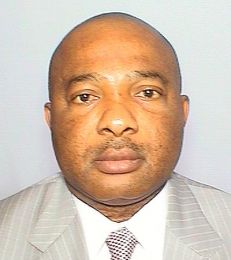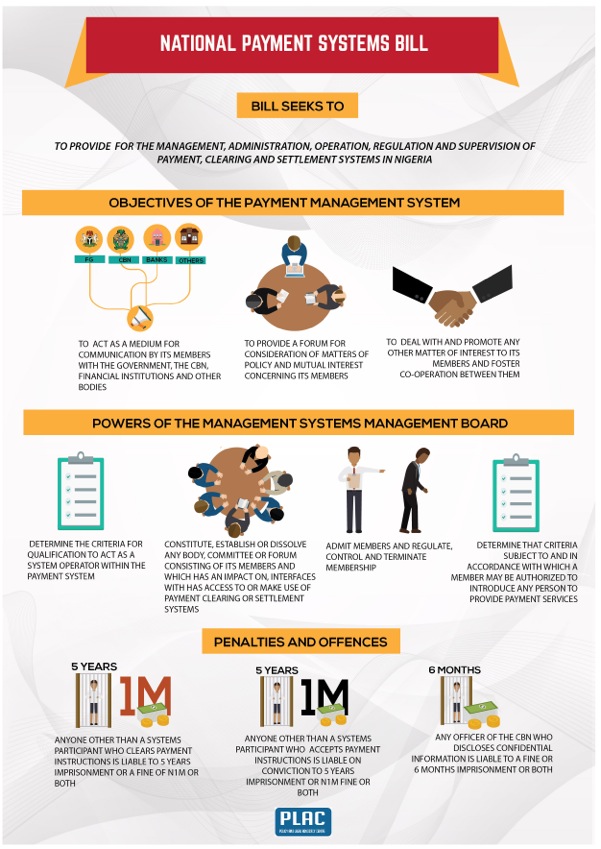SB 05: National Payment System Bill, 2015
Download Bill Bill Analysis Download Bill Analysis Infograph
Sponsor:
Sen. Hope Uzodinma
State:
IMOParty:
Peoples Democratic PartyBill Status: Awaiting Committee Report
- First Reading: 25/06/2015
- Second Reading: 16/11/2016
- Committee Referred To: Committee on Banking, Insurance and Other Financial Institutions
- Consolidated with:
- Date Reported out of Committee:
- Third Reading:
- Reconsidered and Passed:
Bill Analysis:
SHORT TITLE
National Payment System Bill, 2015
OBJECTIVE OF THE BILL
The objective of the Bill is to provide for the management, administration, operation, regulation and supervision of payment, clearing and settlement systems in the Federal Republic of Nigeria and to provide for Connected Matters
NUMBER OF CLAUSES/PARTS
The Bill has 15 clauses, including interpretation and citation.
IMPLICATIONS
If the Bill is passed into law: -
- The Central Bank of Nigeria (CBN) may exercise the powers and must perform the duties conferred and imposed on it by this Bill;
- The CBN may recognize a payment system management body that meets all the conditions listed under Clause 3(2), and established with the objective of organizing, managing and regulating the participation of its members in the payment system;
- No person may clear payment instructions unless that person is a system participant;
- Where a system participant is aggrieved by the decision taken by the CBN, they may agree to settle the dispute by mediation. The cost of the mediation shall be shared equally by the parties;
- Where an arbitrator is appointed to resolve disputes, the provisions of the Arbitration act shall apply; and the decision is final and binding on the parties.
PROVISIONS OF THE BILL
1. Powers of the Central Bank Regarding Payment System
The board of directors of the Central Bank may in writing:
- delegate powers to any officer of the CBN
- authorize the performance of any duty imposed by the CBN
- withdraw at any time, the power to perform such duty
2. Payment System Management Body (PSMB): -
The CBN may recognize a Payment System Management Body (PSMB) if it is satisfied that –
- the PSMB as constituted fairly represents the interest of all banks, mutual banks and branches of foreign institutions participating in the payment system;
- the rules of the PSMB, procedures and practices in relation to admission as members are fair, equitable and transparent;
- it will be enabled to adequately oversee the affairs of the PSMB in the discharge of the CBN’s responsibilities as provided in the CBN Act regarding monitoring, regulation and supervision of payment, clearing and settlement systems
3. Objectives of the PSMB: -
The objectives of the PSMB are: -
- to provide a forum for consideration of matters of policy and mutual interest concerning its members;
- to act as a medium for communication by its members with the government, the CBN, financial institutions and other bodies;
- to deal with and promote any other matter of interest to its members and foster co-operation between them (Clause 4)
4. Powers of the PSMB: -
The rules of a PSMB must empower it to: -
- admit members and regulate, control and terminate membership;
- constitute, establish or dissolve any body, committee or forum consisting of its members and which has an impact on, interfaces with, has access to or makes use of payment, clearing or settlement systems;
- determine the criteria for qualification to act as a systems operator within the payment system
- determine that criteria subject to and in accordance with which a member may be authorized to introduce any person to provide payment services.
5. Settlement Obligations: -
Discharge of settlement obligations is effected in money or by means of entries passed through the settlement system. A final settlement, concluded irrevocably in accordance to the settlement instruction may not be reversed or set aside (Clause 5).
6. Winding-up a System Participant: -
When a system participant is wound up, a copy of the application and subsequent winding-up order must be lodged with the CBN. When a system participant is wound-up, the winding up order does not affect any settlement that has become final and irrevocable, prior to the lodgment of the copy of that order with the CBN (despite Sections 341(2) and 348 of the Companies and Allied Matters Act (CAMA))
If a system participant is wound up or placed under judicial management or a curator is appointed to a system participant, any provision contained in a written netting agreement to which that system participant is a party, or any netting rules and practices applicable to the system participant is binding upon the liquidator, judicial manager or curator as the case may be, in respect of any payment or settlement obligation (Clause 8(2)).
The CBN may in consultation with the PSMB by an order, prescribed by notice in the Gazette such conditions, rules or procedure as it considers necessary regarding the issue of settlement instructions and discharge of settlement obligations.
7. Clearing Offences: -
Only a system participant may clear payment instructions in accordance with Clause 6 of the Bill. Contravention to the provision constitutes an offence
No person may as a regular feature of that person’s business accept money or payment instructions from any other person for the purpose of making payment on behalf of that other person to a 3rd party unless the person accepting payment instructions is a system participant, a person introduced by a system participant or a person exempted by the Ministry of Finance – Clause 7(2)(a) – (c).
Any person who contravenes the provision of Clause 7(2) is guilty of an offence
8. Power of the Minister: -
Clause 7(4) provides that the Minister of Finance may by notice in the Gazette and subject to such conditions as the Minister may determine exempt any person or category of persons from Clause 7(2) if the Minister is satisfied that such exemption will be in the public interest and will not cause undue risk to the payment system.
9. Access to Information: -
System participants must on request provide information on volumes or values of payment and settlement instructions or payment and settlement obligations to the CBN (Clause 10). The CBN may disclose any information of which the disclosure is necessary to protect the integrity, effectiveness or security of the payment system.
Any director or officer of the CBN may not disclose confidential information to any person, except to an officer of the CBN who requires that information for purposes of the execution of his or her duties. Anyone who contravenes the provision of this Clause is guilty of an offence (Clause 10(4))
10. Settlement of Disputes: -
In a situation where the system participant is aggrieved by a decision of the CBN, the participant must in writing furnish the CBN with full particulars of their grievance, and try to settle the dispute within 7 business days after the CBN receives the particulars (Clause 11)
If the dispute resolution does not work, the parties may agree to resort to mediation. The parties would in this case, choose mediator. If the mediation fails, the dispute would be referred to a single arbitrator to be agreed on by the parties (Clause 11(6)). The decision of the arbitrator is final.
11. Systemic Risks: -
If there are reasonable grounds to believe that any person is engaging or about to engage in any act or course of conduct, with respect to the payment system, that results or is likely to result in systemic risk, the CBN may issue a directive in writing requiring the person: -
- to refrain or cease engaging in the act;
- to perform other acts so as to remedy the situation;
- to provide the CBN with documents or information relating to the act within a period of time.
Any person who fails to comply is guilty of an offence. The CBN may apply to the High Court having jurisdiction for an order directing that person to comply with a directive issued.
12. Retention of Records: -
Under Clause 13, the CBN and system participant must retain all records obtained by them during the course of the operation and settlement system for the period of 5 years from the date of each particular record.
13. Penalties: -
Any person convicted of
- Clearing Payment Instructions without License: - Is liable to a fine of N1million or to imprisonment for a period not less than 5 years or both.
- Accepting payment instructions without license: - Is liable to a fine of N1million or 5 years imprisonment or both.
- Failing to respond to a directive from the CBN: - Is liable to a fine of N1million or years imprisonment or both.
- Disclosing a confidential information: - Is liable to a fine or 6months imprisonment or both.
FLAWS OF THE BILL
- The Bill has several random numbers/letters of the alphabet scattered all over. Clause 11(4) starts with the letter ‘H’ and clause 7(2)(c) has the number ‘4’ in between “Minister of Finance”
- Wrongly spelt words are all over the Bill. The word “Gazette” is spelt as “Gazelle” (Clause 7(4)) and “enabled” is spelt as “embled” (Clause 3(2)(c).
- The arrangement of provisions is not chronological, as a result, several clauses have to make reference to earlier clauses, for instance Clause 7 had to reference Clause 6, and Clause 7(2)(b) had to reference Clause 4(2)(d)
CONCLUDING ISSUES
The Bill seeks to provide for the management, administration, operation, regulation and supervision or payment, clearing and settlement systems in Nigeria. As important as the objective of the Bill is, the poor quality of the Bill undermines it. The Bill lacks cohesion and clarity, and contains a lot of typographical errors.
For such an important Bill, efforts should be made to revise and re-format before it is passed.
Infographic:
